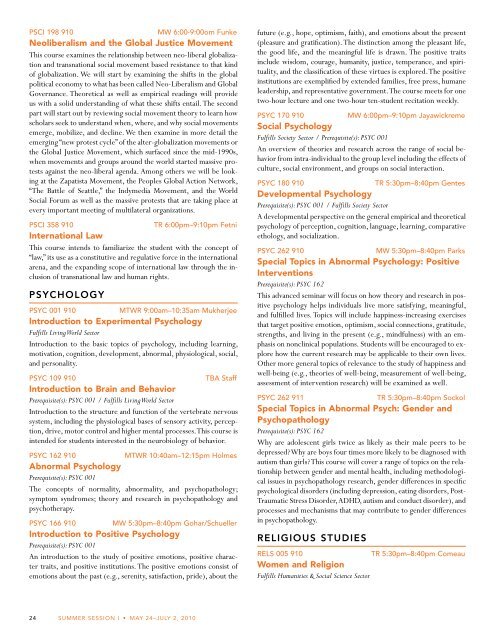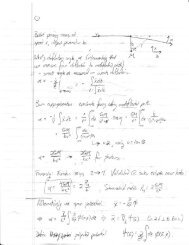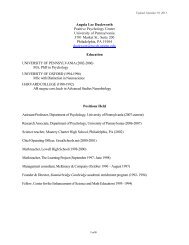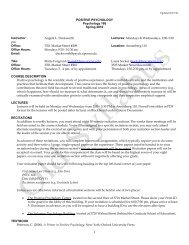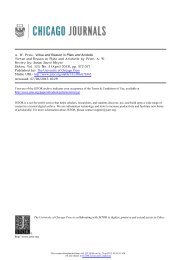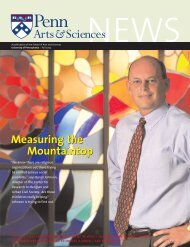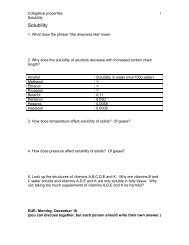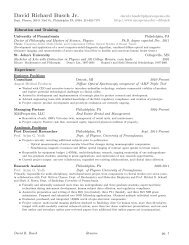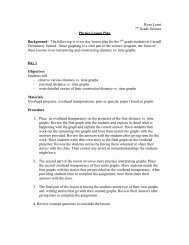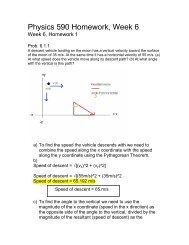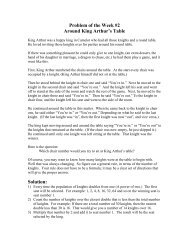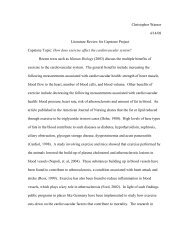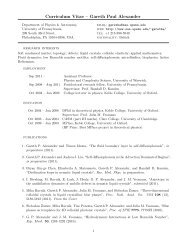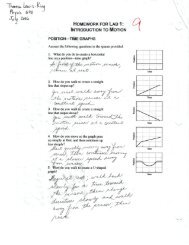PENN SUMMER - University of Pennsylvania
PENN SUMMER - University of Pennsylvania
PENN SUMMER - University of Pennsylvania
You also want an ePaper? Increase the reach of your titles
YUMPU automatically turns print PDFs into web optimized ePapers that Google loves.
PsCI 198 910 MW 6:00-9:00om Funke<br />
Neoliberalism and the Global Justice Movement<br />
This course examines the relationship between neo-liberal globalization<br />
and transnational social movement based resistance to that kind<br />
<strong>of</strong> globalization. We will start by examining the shifts in the global<br />
political economy to what has been called Neo-Liberalism and Global<br />
Governance. Theoretical as well as empirical readings will provide<br />
us with a solid understanding <strong>of</strong> what these shifts entail. The second<br />
part will start out by reviewing social movement theory to learn how<br />
scholars seek to understand when, where, and why social movements<br />
emerge, mobilize, and decline. We then examine in more detail the<br />
emerging “new protest cycle” <strong>of</strong> the alter-globalization movements or<br />
the Global Justice Movement, which surfaced since the mid-1990s,<br />
when movements and groups around the world started massive protests<br />
against the neo-liberal agenda. Among others we will be looking<br />
at the Zapatista Movement, the Peoples Global Action Network,<br />
“The Battle <strong>of</strong> Seattle,” the Indymedia Movement, and the World<br />
Social Forum as well as the massive protests that are taking place at<br />
every important meeting <strong>of</strong> multilateral organizations.<br />
PsCI 358 910 Tr 6:00pm–9:10pm Fetni<br />
International Law<br />
This course intends to familiarize the student with the concept <strong>of</strong><br />
“law,” its use as a constitutive and regulative force in the international<br />
arena, and the expanding scope <strong>of</strong> international law through the inclusion<br />
<strong>of</strong> transnational law and human rights.<br />
PSYCholoGY<br />
PsYC 001 910 MTWr 9:00am–10:35am Mukherjee<br />
Introduction to Experimental Psychology<br />
Fulfills Living World Sector<br />
Introduction to the basic topics <strong>of</strong> psychology, including learning,<br />
motivation, cognition, development, abnormal, physiological, social,<br />
and personality.<br />
PsYC 109 910 TBa staff<br />
Introduction to Brain and Behavior<br />
Prerequisite(s): PSYC 001 / Fulfills Living World Sector<br />
Introduction to the structure and function <strong>of</strong> the vertebrate nervous<br />
system, including the physiological bases <strong>of</strong> sensory activity, perception,<br />
drive, motor control and higher mental processes. This course is<br />
intended for students interested in the neurobiology <strong>of</strong> behavior.<br />
PsYC 162 910 MTWr 10:40am–12:15pm holmes<br />
Abnormal Psychology<br />
Prerequisite(s): PSYC 001<br />
The concepts <strong>of</strong> normality, abnormality, and psychopathology;<br />
symptom syndromes; theory and research in psychopathology and<br />
psychotherapy.<br />
PsYC 166 910 MW 5:30pm–8:40pm gohar/schueller<br />
Introduction to Positive Psychology<br />
Prerequisite(s): PSYC 001<br />
An introduction to the study <strong>of</strong> positive emotions, positive character<br />
traits, and positive institutions. The positive emotions consist <strong>of</strong><br />
emotions about the past (e.g., serenity, satisfaction, pride), about the<br />
24 <strong>SUMMER</strong> SESSIOn I • MAY 24–JULY 2, 2010<br />
future (e.g., hope, optimism, faith), and emotions about the present<br />
(pleasure and gratification). The distinction among the pleasant life,<br />
the good life, and the meaningful life is drawn. The positive traits<br />
include wisdom, courage, humanity, justice, temperance, and spirituality,<br />
and the classification <strong>of</strong> these virtues is explored. The positive<br />
institutions are exemplified by extended families, free press, humane<br />
leadership, and representative government. The course meets for one<br />
two-hour lecture and one two-hour ten-student recitation weekly.<br />
PsYC 170 910 MW 6:00pm–9:10pm Jayawickreme<br />
Social Psychology<br />
Fulfills Society Sector / Prerequisite(s): PSYC 001<br />
An overview <strong>of</strong> theories and research across the range <strong>of</strong> social behavior<br />
from intra-individual to the group level including the effects <strong>of</strong><br />
culture, social environment, and groups on social interaction.<br />
PsYC 180 910 Tr 5:30pm–8:40pm gentes<br />
Developmental Psychology<br />
Prerequisite(s): PSYC 001 / Fulfills Society Sector<br />
A developmental perspective on the general empirical and theoretical<br />
psychology <strong>of</strong> perception, cognition, language, learning, comparative<br />
ethology, and socialization.<br />
PsYC 262 910 MW 5:30pm–8:40pm Parks<br />
Special Topics in Abnormal Psychology: Positive<br />
Interventions<br />
Prerequisite(s): PSYC 162<br />
This advanced seminar will focus on how theory and research in positive<br />
psychology helps individuals live more satisfying, meaningful,<br />
and fulfilled lives. Topics will include happiness-increasing exercises<br />
that target positive emotion, optimism, social connections, gratitude,<br />
strengths, and living in the present (e.g., mindfulness) with an emphasis<br />
on nonclinical populations. Students will be encouraged to explore<br />
how the current research may be applicable to their own lives.<br />
Other more general topics <strong>of</strong> relevance to the study <strong>of</strong> happiness and<br />
well-being (e.g., theories <strong>of</strong> well-being, measurement <strong>of</strong> well-being,<br />
assessment <strong>of</strong> intervention research) will be examined as well.<br />
PsYC 262 911 Tr 5:30pm–8:40pm sockol<br />
Special Topics in Abnormal Psych: Gender and<br />
Psychopathology<br />
Prerequisite(s): PSYC 162<br />
Why are adolescent girls twice as likely as their male peers to be<br />
depressed? Why are boys four times more likely to be diagnosed with<br />
autism than girls? This course will cover a range <strong>of</strong> topics on the relationship<br />
between gender and mental health, including methodological<br />
issues in psychopathology research, gender differences in specific<br />
psychological disorders (including depression, eating disorders, Post-<br />
Traumatic Stress Disorder, ADHD, autism and conduct disorder), and<br />
processes and mechanisms that may contribute to gender differences<br />
in psychopathology.<br />
reliGioUS STUDieS<br />
rels 005 910 Tr 5:30pm–8:40pm Comeau<br />
Women and Religion<br />
Fulfills Humanities & Social Science Sector


